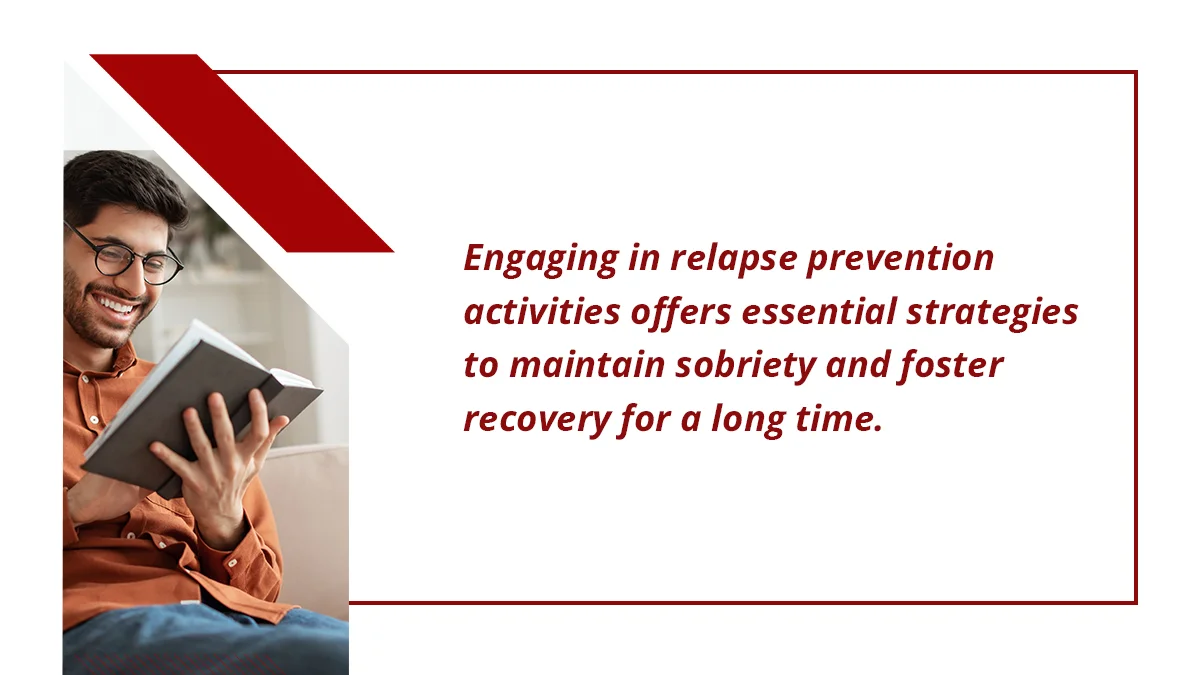
Understanding Narcissistic Personality Disorder (NPD)
Explore the symptoms, causes, and treatments for narcissistic personality disorder with Indiana Center for Recovery.
Engaging in interactive activities can be a powerful tool for healing and growth in the journey toward mental health and substance abuse recovery. These activities provide a constructive outlet for emotions, foster community, and promote well-being.
Whether you’re just starting or looking to maintain your progress, these interactive activities offer various options to help you find what works best. Dive in, explore, and discover broad categories of activities to support your holistic recovery journey.
Engaging in interactive activities supports mental health and substance use recovery by providing useful channels. Here’s what you need to know:
Ready to start your journey to mental health or addiction recovery? Call Indiana Center for Recovery at (844) 650-0064 today.

Recovery is not just about overcoming the instant challenges posed by mental illness or addiction but also about building a fulfilling and resilient life. It involves healing from the negative result of traumatic experiences, learning to manage symptoms, and rebuilding relationships.
Interactive activities play a vital role in the recovery process for both psychological health and substance use disorder (SUD). These activities provide meaningful ways to engage the mind and body, offering a distraction from sadness, negative thoughts, and cravings.
By participating in activities in different groups, individuals can discover new interests and cultivate a balanced lifestyle that supports long-term recovery.
Regular physical exercise can improve mood, reduce depression and anxiety, and enhance self-esteem. Here are some beneficial physical activities to consider:
Each activity offers unique benefits and can be tailored to fit individual preferences.
Creative pursuits can help individuals explore their feelings through different things. Here’s a closer look at some key areas within creative arts and crafts:
Each activity allows individuals to explore their creativity and prevent self-defeating behaviors.
Participating in group settings allows individuals to share their experiences, which is essential for long-term recovery. Here are some engaging activities:
These activities promote personal healing in group participants and nurture a supportive community.
Nature-based activities foster a connection with the natural world, promoting healing. Here, we explore some:
Each activity offers a pathway to recovery, encouraging participants to explore new avenues of healing.
Mindfulness practices are innovative techniques for promoting positive behavioral changes and reducing disappointments during recovery. Here are some beneficial activities:
These activities are designed to cultivate mindfulness, reduce anxiety, and support emotional well-being.
Technology-based activities offer accessible and a great way to improve mental health and substance abuse recovery issues. Here’s a structured list of resources for technology-based activities:
Explore these innovative tools to empower your journey toward healing and happiness.
Nutritional and culinary activities cultivate motivation through healthy eating practices and culinary skills development. Here are some useful activities:
These activities foster a holistic approach to recovery, promoting well-being through nutritious food and culinary exploration.
Family involvement plays a crucial part in fostering mutual support and is essential for mental health and substance abuse issues. Here are some activities:
These activities provide a supportive environment crucial for holistic recovery.
Engaging in relapse prevention activities offers essential strategies to maintain sobriety and foster recovery for a long time. Here are some activities:
These actions empower individuals with the tools and support needed to navigate challenges.
Engaging in cognitive and educational activities promotes mental wellness and enhances self-knowledge in all ages. Here are some useful activities:
These activities foster resilience and empower individuals on their journey toward recovery and personal success.
Engaging in activities like yoga, art therapy, and group support sessions can greatly benefit mental health and substance abuse recovery. These activities help manage stress, improve mood, and build a supportive community. Physical exercises release chemicals like endorphins in the brain, reducing anxiety and boosting self-esteem.
Creative activities allow for expression and healing. Settings in specific groups provide understanding and encouragement from others going through similar experiences. Together, these activities promote overall well-being and help maintain progress toward recovery.
Substance abuse group activities can include a support group discussion where people share their experiences and encourage each other. Mindfulness sessions help manage stress and promote relaxation. Art therapy allows creative expression and healing.
Role-playing exercises teach skills like assertiveness and coping strategies. Fitness classes, like yoga or team sports, promote physical health and build camaraderie. Outdoor activities such as hiking foster a sense of adventure and connection with nature. These self-sufficient survival skills support recovery by building social skills and providing positive cognitive changes.
Are you struggling with addiction or a mental health condition? You’re not alone. Indiana Center for Recovery is here to support you in reclaiming your life.
Our medical detox program ensures a safe beginning by eliminating harmful toxins from your body. Additionally, the residential treatment provides round-the-clock intensive care for those navigating a mental health problem.
Additionally, we offer tailored mental health care services to meet your specific needs, utilizing proven therapies and medications to help you break free from various mental disorders. For dual diagnosis treatment, we integrate comprehensive care to address both addiction and mental health challenges simultaneously.
Contact us now at (844) 650-0064 for more information, and begin your journey to recovery today.
